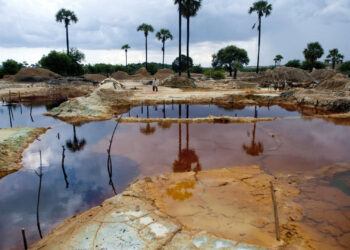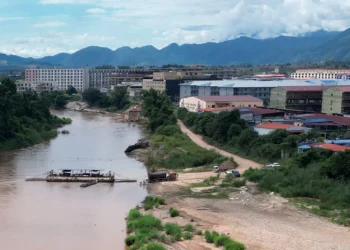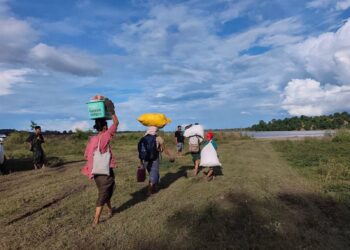Seconds after recognising the sound of a fighter jet overhead, U Myo remembers an explosion he could compare only to thunder.
The 57-year-old was tending to his cattle in a pasture outside the village of Pa Zi Gyi on the morning of April 11, when Myanmar military aircraft twice bombed a gathering held to commemorate the opening of a small administrative office under the publicly mandated National Unity Government (NUG).
Members of every household in the farming hamlet of 800 residents in Sagaing Region’s Kanbalu Township were in attendance, sheltering under a simple structure of wood and corrugated metal sheets to enjoy a special meal of pork curry, vermicelli soup and fermented mango salad ahead of the Myanmar New Year.
The bombs hit the building and the field where they had gathered to socialise and eat. Amid flames and smoke billowing hundreds of metres upward, U Myo rushed to the site of the blasts, immediately confronted with cries from the wounded for help.
“They were screaming, ‘Can nobody save us?” he recounted in a phone interview with Myanmar Now. “Some were drenched in blood and were running around hysterically.”
U Myo recognised one of the victims, 70-year-old Myint Wai, who pleaded with him to amputate his legs, which had been crushed. His injuries proved fatal.
“Both of his legs were mangled, with pieces of flesh protruding out. I did not dare to cut them off,” he said.
U Myo later found that his sister Ma Zaw, aged 30, and his brother, Naing Min Tun, 20, were among the dead, which, at the time of reporting, exceeded 170 people out of around 200 in attendance that day. Among the deceased were more than 30 children, including an infant as young as three months old.
Other villagers interviewed by Myanmar Now said that three entire families had been wiped out in the assault, with no known surviving relatives.
The NUG-appointed administrator for Pa Zi Gyi, Hla Oo, and the village’s security and public defence chiefs Tun Yin and Myat Lin, were also killed.
Military spokesperson Gen Zaw Min Tun has claimed that the attack was legitimate, describing the target as a meeting of anti-junta People’s Defence Force members, who he described as “terrorists.” High numbers of casualties were presumably compounded by the presence of weapons and gunpowder that he alleged had been stored in the area by these resistance groups.
As news spread from independent media outlets about the dozens of minors slain in the airstrike, junta-run newspapers published an April 14 article accusing anyone present at the event in Pa Zi Gyi of having ties to “terrorists,” with the text accompanied by photos of children wielding guns.
Just 10 minutes after the aerial bombing by the military fighter jet, a helicopter arrived in Pa Zi Gyi, with troops on board opening fire on the area below, targeting survivors and those assisting the scores of wounded people.
U Myo was forced to hide in a nearby ditch where he said he could feel the gunshots reverberating on the earth around him.
A number of those who were injured but had survived the initial explosions were killed during the second attack, he said.
Another resident of Pa Zi Gyi who withheld her name out of fear for her safety, said that she had attended the April 11 ceremony with her entire family, looking forward to the festive meal on offer.
She left the event just before the bombing, carrying her infant daughter but leaving behind her mother and 7-year-old elder child July Moe, who were later found among the casualties.
“When I was leaving, I asked my daughter to go back home with me, pointing out that there was no food she liked at the event. But she refused—she wanted to be in the company of her friends, even if she did not want to eat,” the woman explained.
Four of her young friends were also killed alongside her.
As the mother walked away from the site, she heard the same explosions described by U Myo, followed by shots fired from the army helicopter. Her baby close to her chest, she had no choice but to run in the opposite direction.
Now she is among a small group of survivors sheltering on tarps and the parched earth under trees in the nearby forest, unable to return home.
Another woman staying at the same site told Myanmar Now in a recent video interview that two of her sons and her teenage daughter were killed in the attack. She cried remembering how she had pushed her older children to complete high school, and for their futures now lost.
“Oh my sons, I told you never to speak a word about not wanting to go to school. I wanted to see you graduate from university,” she mourned, describing a feeling of defeat as she alluded to the surviving villagers’ meagre defences of machetes and muskets in the face of the junta’s sophisticated military machine.
“Now we have to give in. We cannot match their power.”
Source – Myanmar Now






